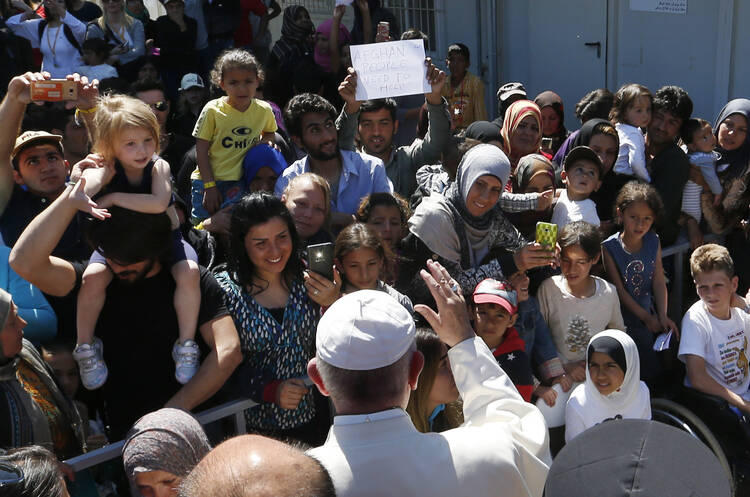Over the weekend Pope Francis visited a detention center on the Greek isle of Lesbos, where thousands of refugees seek asylum from the violence in their home countries. “Today is a day to weep,” he told reporters on the flight home, after showing them drawings by interred children, including one of the sun crying. “If the sun is able to cry, we should be able to shed at least one tear.”
A little over a week earlier, the pope released his lengthy exhortation on the family “Amoris Laetitia,” in which among other things he suggested that those who find themselves in “irregular unions” could potentially be welcomed back into full communion with the church, that “personal and pastoral discernment” is necessary. Reactions in some quarters to this possibility were quite severe. Michael Brendan Dougherty in The Week described the text as a mixture of “cowardly obfuscation” of the issues and “hubris” in the extreme: “The message is clear: God’s grace is insufficient to assist you to do what he asks of you. Jesuits can do better.”
Steve Skojec, writing in “Foreign Policy,” labeled the pope “the Dictator of the Vatican,” a “ruthless” autocrat who many within the Vatican want dead. (He cites a former Vatican official, but still—yikes.)
Some who support the document also seemed to be taking pleasure in trolling its critics. I must admit, with great initial satisfaction I tweeted at Mr. Dougherty a favorite “Return of the Jedi” quote: “Good! Use your aggressive feelings. Let the hate flow through you!”
But what purpose does such mockery serve? Indeed, how is the Kingdom brought closer to the here and now by name-calling or by taking what it is clearly intended as a thoughtful pastoral document, one that suggests options to consider rather than legislating policy, and placing it in its worst possible light? (Proposing the divorced could receive Communion means the pope is a power-crazed ideologue? Really?)
How are the poor served by our mutual animosity or the broken aided by our hyperbole?
Writing last week in Eureka Street, a publication of the Australian Jesuits, Andrew Hamilton, S.J., argued that the biggest risk to the lasting impact of the papacy of Francis may not be his critics. No: "The greatest threat to Francis' legacy may come from supporters who applaud his language, but fail to embody his words in changes to their personal and congregational life.”
The pope has been in office nearly three full years. In that time he has been nothing if not prophetic in word and deed. This weekend not only did he visit the asylum seekers on Lesbos, he brought three cleared refugee families back to the Vatican.
But how has his example affected us? How are you and I different in our thoughts and actions today?
It’s a question we each need to answer. For myself I’d say despite a desire to be more merciful, to try and enter into the chaos of others, the actual difference in my behavior is thus far woefully little. (See: time spent Jedi-hazing.)
Real change is challenging, there is no doubt. It involves sacrifice and vulnerability. But I’m not sure the call to us is ever going to be clearer. It’s like that old joke about the guy in the flood who refuses to travel to safety either when the boat comes or the helicopter because he’s busy for waiting for God to save him. After he drowns God asks him, “For Heaven’s sake, I sent you a boat and a helicopter. What more did you need?”
We can choose to lose ourselves in meaningless squabbles, to ad hominem, silence and/or fire those who fundamentally are just calling us to kindness and mercy. What we can’t do is deny the fact that we do so not only at our peril but more importantly at the great peril of our brothers and sisters who are in need.








